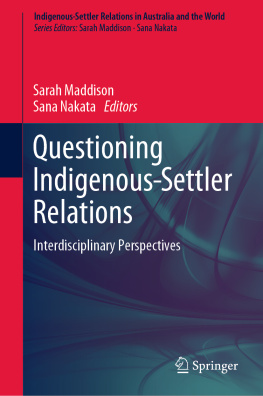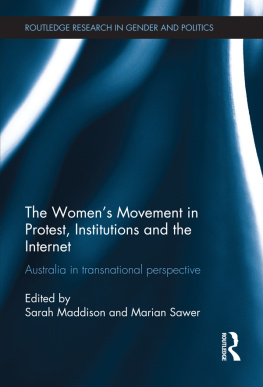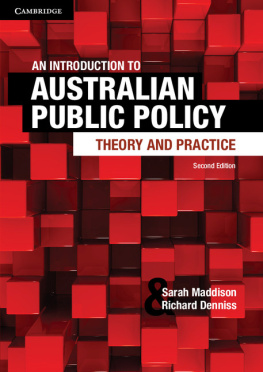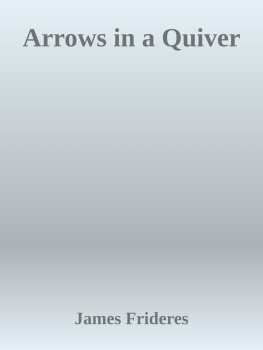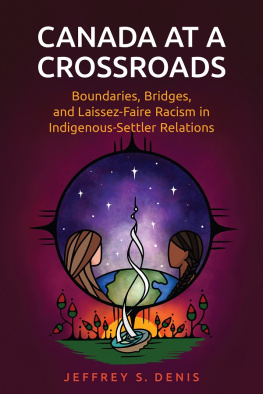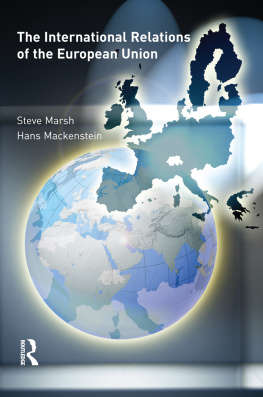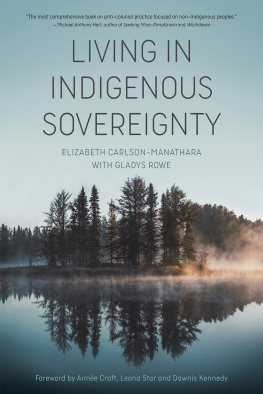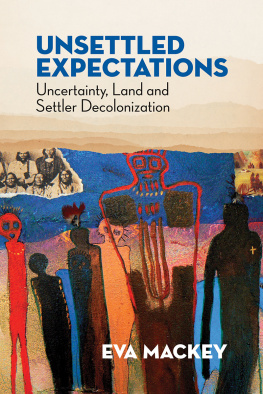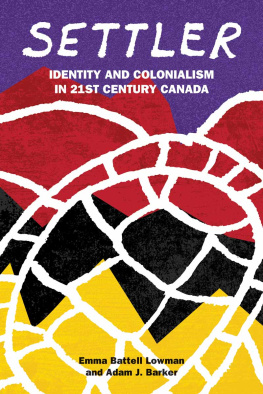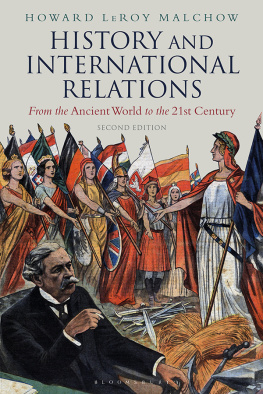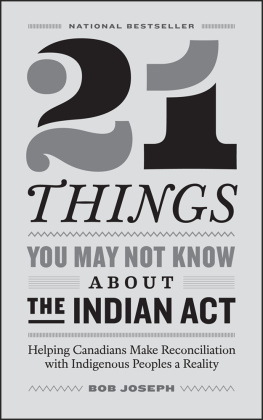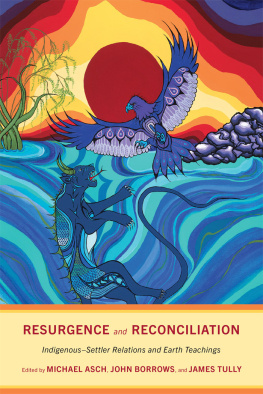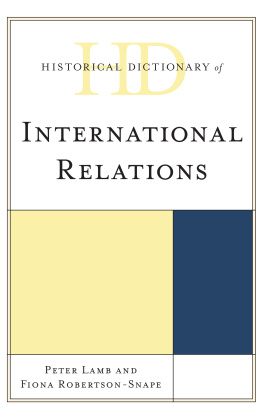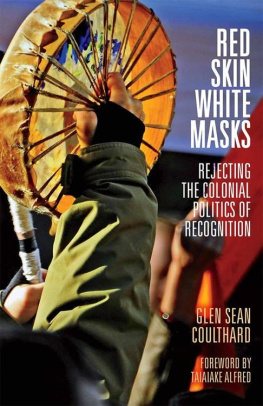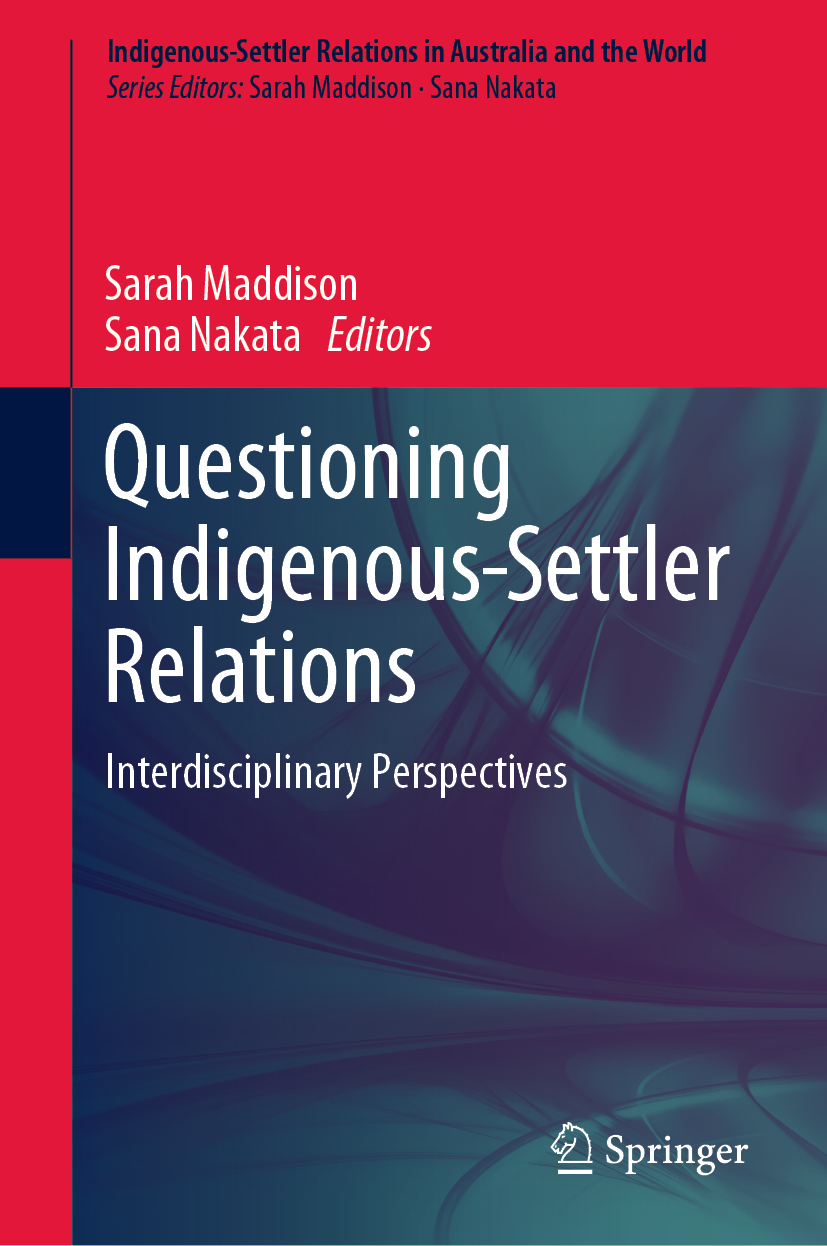Volume 1
Indigenous-Settler Relations in Australia and the World
Series Editors
Sarah Maddison
School of Social and Political Sciences, University of Melbourne, Melbourne, VIC, Australia
Sana Nakata
University of Melbourne, Melbourne, VIC, Australia
Editorial Board
Miriam Jorgensen
Native Nations Institute, University of Arizona, Tucson, AZ, USA
Sheryl Lightfoot
Department of Political Science, University of British Columbia, Vancouver, BC, Canada
Morgan Brigg
University of Queensland, St. Lucia, QLD, Australia
Yin Paradies
Deakin University, Burwood, VIC, Australia
Jeff Denis
McMaster University, Hamilton, ON, Canada
Bronwyn Fredericks
University of Queensland, St. Lucia, QLD, Australia
Libby Porter
RMIT University, Melbourne, VIC, Australia
The series, Indigenous-Settler Relations in Australia and the World, brings together scholars interested in examining contemporary Indigenous affairs through questions of relationality. This is a unique approach that represents a deliberate move away from both settler-colonial studies, which examines historical and present impacts of settler states upon Indigenous peoples, and from postcolonial and decolonial scholarship, which is predominantly interested in how Indigenous peoples speak back to the settler state. Closely connected to, but with meaningful contrast to these approaches, the Indigenous-Settler Relations series focuses sharply upon questions about what informs, shapes and gives social, legal and political life to relations between Indigenous peoples and non-Indigenous peoples, both in Australia and globally.
This is an important and timely endeavour. In Australia, relations between Aboriginal and Torres Strait Islander peoples and the state are at an impasse. In the wake of the governments rejection of the Uluru Statement in 2017 there is no shared view on how Indigenous-settler relationships might be reset, or even if this is possible. The contemporary Indigenous affairs policy domain is characterised by confusion, frustration and disappointment that, despite a seemingly endless succession of policy regimes, efforts to close the gap between Aboriginal and Torres Strait Islander peoples and other Australians have not resulted in progress.
It is into this contested space that the Indigenous-Settler Relations series seeks to intervene with new, agenda-setting research. The series editors are based in a research unit in the Faculty of Arts at the University of Melbournethe Indigenous Settler Relations Collaboration. The series will build on the work of the Collaboration in bringing together scholars and practitioners from around Australia, and around the worldparticularly other Anglophone settler colonial societies such as Canada, the United States and New Zealandwhose work is concerned with Indigenous-settler relations across a range of disciplines. The multi-faceted approach to Indigenous-Settler Relations that defines the series seeks to capture how the question of relationality is already being asked by scholars across disciplines including political science, history, sociology, law, media, and cultural studies.
Readers of this series will look to it for fresh perspectives and new ideas about how to transform Indigenous-settler relations in Australia and elsewhere. They will learn from the leading lights in an emerging field who will connect their rich, multi-disciplinary scholarship to urgent social and political questions at the heart of Indigenous-Settler relations.
More information about this series at http://www.springer.com/series/16142
Editors
Sarah Maddison and Sana Nakata
Questioning Indigenous-Settler Relations
Interdisciplinary Perspectives
Editors
Sarah Maddison
School of Social and Political Sciences, University of Melbourne, Melbourne, VIC, Australia
Sana Nakata
School of Social and Political Sciences, University of Melbourne, Melbourne, VIC, Australia
ISSN 2524-5767 e-ISSN 2524-5775
Indigenous-Settler Relations in Australia and the World
ISBN 978-981-13-9204-7 e-ISBN 978-981-13-9205-4
https://doi.org/10.1007/978-981-13-9205-4
Springer Nature Singapore Pte Ltd. 2020
This work is subject to copyright. All rights are reserved by the Publisher, whether the whole or part of the material is concerned, specifically the rights of translation, reprinting, reuse of illustrations, recitation, broadcasting, reproduction on microfilms or in any other physical way, and transmission or information storage and retrieval, electronic adaptation, computer software, or by similar or dissimilar methodology now known or hereafter developed.
The use of general descriptive names, registered names, trademarks, service marks, etc. in this publication does not imply, even in the absence of a specific statement, that such names are exempt from the relevant protective laws and regulations and therefore free for general use.
The publisher, the authors and the editors are safe to assume that the advice and information in this book are believed to be true and accurate at the date of publication. Neither the publisher nor the authors or the editors give a warranty, expressed or implied, with respect to the material contained herein or for any errors or omissions that may have been made. The publisher remains neutral with regard to jurisdictional claims in published maps and institutional affiliations.
This Springer imprint is published by the registered company Springer Nature Singapore Pte Ltd.
The registered company address is: 152 Beach Road, #21-01/04 Gateway East, Singapore 189721, Singapore
Acknowledgements
We wish to acknowledge that many individuals and communities have made this book possible. Many of the chapters in this collection were first presented at a research workshop hosted by the IndigenousSettler Relations Collaboration at the University of Melbourne. This workshop was made possible due to the funding support of the Social and Political Sciences Workshop Funding scheme and the Faculty of Arts, which funds the IndigenousSettler Relations Collaboration. Other contributions benefited from the support of the 2018 Trinity College Indigenous Higher Education Conference. And other contributions still have been forthcoming due to their collegiate enthusiasm and intellectual commitment.
Ilaria Walker first commissioned the book series, Indigenous-Settler Relations in Australia and the World , of which this title is our first offering. We are grateful for her vision and trust during these early stages and to Nick Melchior who has sustained that commitment.
We acknowledge Prof. Yin Paradies who reviewed the full manuscript and offered valuable criticism and constructive advice to all our contributors. Our research assistant, Tristen Harwood, has calmly and steadily overseen the production of this volume from the earliest stages of workshopping and submitted drafts across the review process, resubmissions and now to this polished endpoint.
Most importantly, this book has been made possible due to the Wurundjeri peoples of the Kulin nations upon whose unceded territories the Parkville campus of the University of Melbourne resides. Our occupation of their land is an injustice that will possibly never be made right. These words alone do very little to provide deserving reparations for that irreparable loss. We sit with that discomfort daily while working toward better relations between our institutions and First Nations peoples everywhere.

